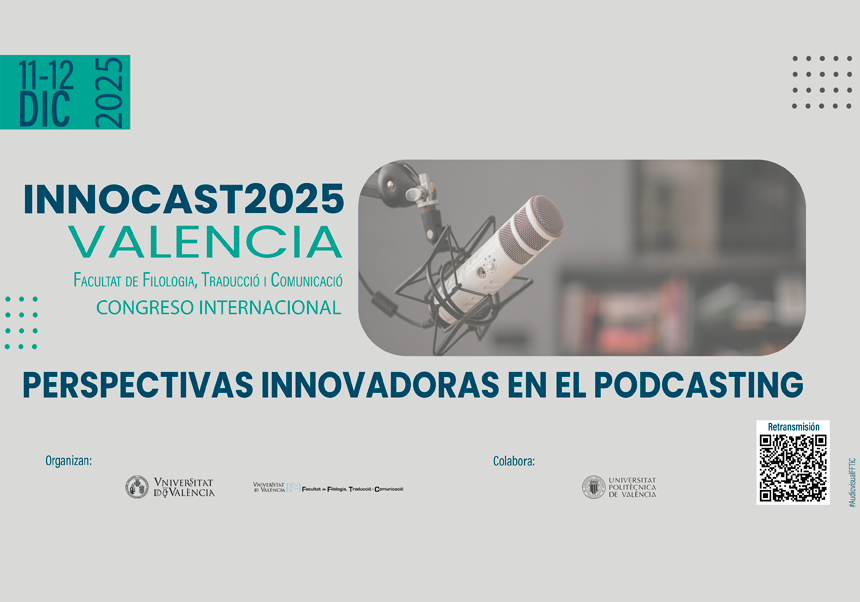
11–12 December 2025
Faculty of Philology, Translation and Communication
University of Valencia
In today's media ecosystem, characterised by hyperconnectivity, the proliferation of smart devices and the impact of artificial intelligence, podcasting has established itself as a central format in the creation, circulation and consumption of audio content. In this context, the INNOCAST 2025 Conference is presented as a space for reflection and academic exchange aimed at analysing innovative perspectives on podcasting and its future prospects from an interdisciplinary approach. The purpose of the meeting is to contribute to the study of podcasting as a medium of growing relevance in the fields of communication, education, culture and technology, addressing its theoretical and practical implications, as well as its challenges and opportunities in a constantly changing media environment.
Thematic areas
1. Podcasts, higher education and training processes
This thematic area proposes to examine the role of podcasts as a pedagogical resource and as an institutional communication tool in the field of education. This includes research on podcast-based teaching methodologies, their contribution to active and collaborative learning, the development of communication skills, as well as case studies on the production and circulation of podcasts in university and school contexts, including their link to the evolution of university radio.
2. Podcasts, artificial intelligence and future challenges
We invite submissions that analyse how podcasts are adapting to technological, economic and social transformations. Topics of interest include the evolution of the format, video podcasts, sustainability and monetisation models, forms of interactivity, audience studies and, in particular, the impact of artificial intelligence, machine learning and big data on production, distribution and consumption processes.
3. History and evolution of radio and podcasts
This thematic area focuses on historical and comparative studies that address the trajectory of radio and the emergence of podcasts. It includes research on relevant milestones, content transformations, media convergence processes, and analysis of the role of these formats in different social and cultural contexts.
Each participant may submit their proposal for a presentation by December 1st 2025 to the email address congresoinnocast@gmail.com
A Word document must be sent with the following information:
- First and last names of the author(s)
- Institutional affiliation
- Title of the paper
- Abstract (300 words)
- Subject area
- In-person or online presentation
- Option to publish the full texts:
1. Proceedings book to be published in institutional repositories (Roderic and Dialnet) with a DOI identifier.
2. Opt for publication in Dígitos. Revista de Comunicación Digital, a partner of the conference. Submissions will be made through the journal's platform and will undergo the usual editing and blind peer review process.
3. The full text will not be submitted.
If you choose the first option (proceedings book), the full texts may be sent to the same email address until 30 January 2026. The texts should be between 5,000 and 7,000 words long.
Papers will be presented in person at the Faculty of Philology, Translation and Communication of the University of Valencia or online in synchronous mode on Thursday, 11 December 2025 (time to be confirmed).
The fee for presenting a paper is €30 per participant. Each participant may present up to three papers.








